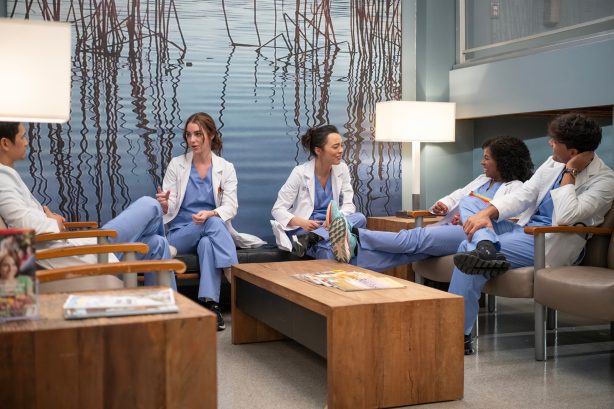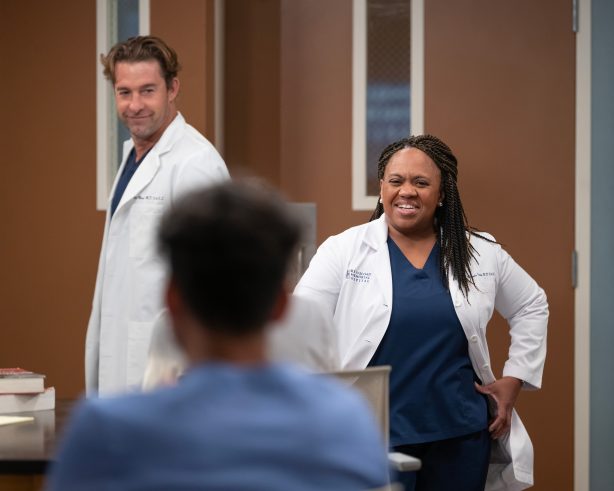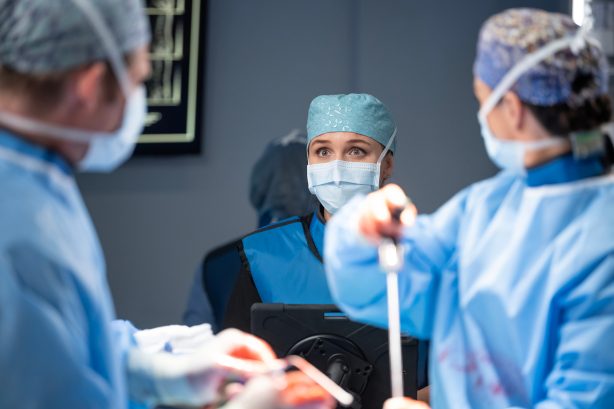As Disney gears up to celebrate World Storytelling Day on Wednesday, March 20, we are highlighting storytellers from all corners of our company, including Disney Entertainment Television.
Meg Marinis is the new showrunner of ABC’s Grey’s Anatomy, airing Thursdays at 9 p.m. ET/PT on ABC and streaming next day on Hulu. She joined the series in 2006 as a writer’s assistant and was later promoted to medical researcher, staff writer, story editor, and producer, before ultimately, showrunner. “Writers have a lot of weird steps!” she explains.
According to Marinis, good storytelling relies on more than the written word; it takes a collaborative effort and a commitment to helping audiences identify with the characters.

How do you use storytelling in your role?
It’s not just about what goes on the page for me. We tell stories in the writers room, but then also we tell stories through the medicine. We tell stories through the props. We tell stories through costumes. Even deciding when one of our characters is in scrubs versus when they’re in their street clothes is a story point. There’s more to telling stories in TV what’s written on the page. And then we’re changing the stories in editing. We’re making things funny or we’re making things sad. The storytelling is really across the board, and I think that’s why I love this job so much: You have to think of different ways to tell stories.
What do you love most about being part of the Disney story?
I love being a part of something that affects people around the world. That’s rare. The platform Disney provides is incredible; not everyone gets to tell such wide-reaching stories. It’s an amazing feeling to reach audiences far and wide—and Disney make that all happen.

Why do you think storytelling is so important at Disney?
Disney has been a part of my life since I was born; it has something for everyone, and it’s something we’ve all grown up with. We watched Disney stories as little kids, we watched Disney stories as teenagers, and we’re still watching Disney stories as adults. Disney stories are relatable at any age—and in today’s world, we need those stories to process our own emotions and feelings about everything that’s going on. I think a lot of people feel pressure to keep everything inside, but when you watch these stories, it’s like an emotional catharsis, right? The stories allow you to feel your feelings while you’re feeling a character’s feelings.
What is the secret to telling a really good story?
Authenticity—really getting into a character’s lived experience. For us, it’s also medical accuracy. Understanding medical cases from the beginning to the end allows us to find the real, emotional moments that the people who are going through those things might feel.
How has your storytelling perspective changed from the beginning of your career until now?
There’s the obvious one: I’m older! I got married and had a kid on the show, and with those things comes a maturity that I think we all hope to come to as adults. It’s really nice that I’ve had almost 20 years to reflect on how I tell stories differently. The history of the show—knowing what has been successful and what hasn’t been—has evolved how I tell stories. And now that I know how hard it is to shoot certain scenes, I also want to make sure that I’m doing everything responsibly and safely. I always have that going on in the back of my head, as someone who’s now in a leadership role. I often have to ask myself, “Is this story financially responsible? Is this safe to shoot for the cast and crew?” It’s things like that.

Which stories are you most proud of telling on Grey’s Anatomy?
I’m not bragging, but I’m so proud of so many! I’m just grateful I’ve gotten to do it. When you first start out, you can’t believe that you got this job. And then when an episode airs, you’re like, “I can’t believe it!” You can’t help but be proud. But some highlights for me include anything with a catastrophe on location—things like the tunnel collapse or the wind storm. Those require huge collaborations between all the different departments. I’m so proud of all the teamwork that goes into making those, because it’s one thing to write it on the page, but it’s another thing for a group of people to build something out of nothing.
I was very proud of the episode [Disney Legend Ellen Pompeo] directed, about Maggie’s mom dying. It was just so wonderful to watch Ellen in that new role—and gosh, she was amazing! I also love that episode because going through the death of a parent is so universal. That one that really resonated with the fans…. I was really proud of part of the 350th episode, were Meredith had to fight for her medical license. It was my love letter to Meredith Grey—what she meant to all of her patients and what she means to all the fans.
Grey’s Anatomy is a very quotable series. Do you have any favorite lines?
I’m grateful that people think that it’s good enough to quote! There are some lines you read in a script and you’re like, “Oh… that’s going to be a meme!” And most of them are Bailey’s lines. I’m personally a sucker for the Meredith/Ellis dynamic, so any of the “extraordinary or ordinary” lines from the early seasons always resonate with me. Cristina’s line about the E.R.—”It’s like candy, but with blood, which is so much better”—is a good one. The comedy on our show is so specific, and that’s a credit to the writers and to Shonda Rhimes. I always say to new members of the staff, “If you think you’ve heard it, erase it, because that’s what this show is so good at—inventing new terms, flipping jokes upside down, and saying the opposite of what you think a person might say.” That’s what keeps the show interesting. I mean, Grey’s has named body part! You can’t get bigger than that, right?